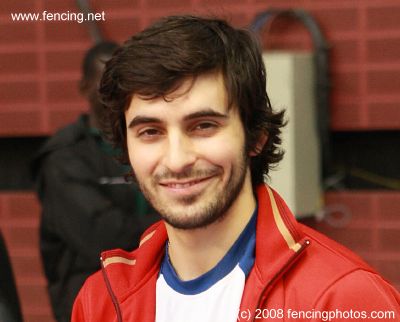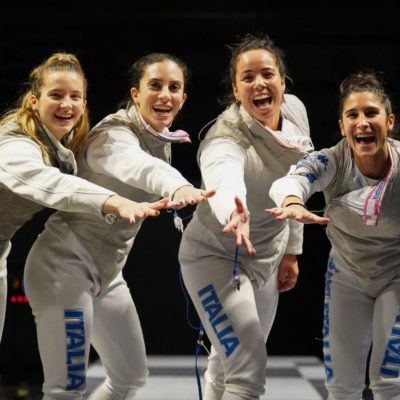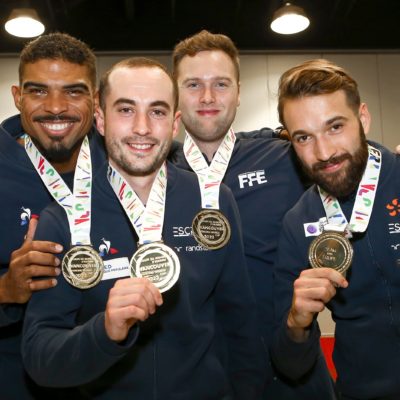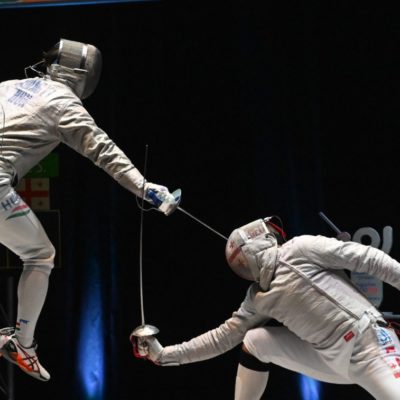
Serge Timacheff (fencingphotos.com) interviews Jason Rogers of the US Men’s Sabre team at the Algeria Grand Prix.
In this interview, Jason talks about the US Men’s Sabre team, why this is a "slow" season in terms of the level of fencing and some of his picks to go deep into the individual tournament.
{audio}https://fencing.net/podcast/jason_rogers_algeria2008.mp3{/audio}
Now Available via iTunes!
To subscribe to the Fencing Podcast, just search for "fencing" on iTunes and you’ll find our logo! You can also pull in the RSS Feed below to import the podcast into your iPod or other media device.
Transcript
Serge Timacheff: Jason Rogers, we’re here in Algeria at the Grand Prix in the pre Olympic season. Tell us how the men’s Saber team is doing at this point?
Jason Rogers: Well, we’ve had a bit of a rocky season. I have to start off by saying that, but it’s improving, that’s for sure. We’ve had, I think this is our eighth World Cup in a row so we are a little bedraggled, a little tired, but we’re starting to see some improving results, guys are fencing better, we’re fencing better in the first rounds which is actually really helping us in the second round so we can make it a little farther because our first draws aren’t guys in the top 16. So we haven’t had the season like we had last time where we actually had a stretch of maybe like five or six or seven tournaments where somebody made a final. But, Tim Moore has been doing great this season; he made a couple of finals. Keith Smart just took second at the Grand Prix in Budapest so as a team we can’t complain too much.
Serge: How about you, how have you been doing?
Jason Rogers: It’s also been a little rocky. I’ve lost some really close bouts. I lost three bouts 15 to 14 this season. So, hopefully I got a little luck today, hopefully I can get a little more luck tomorrow and you know, in fencing it’s always just the flip of a coin sometimes so hopefully we’ll see some things go my way.
Serge: Characterize the Olympic qualification process, but more specifically as it relates to Saber and give us the general picture right now.
Jason Rogers: Well, it’s much different than any other year. I think anyone sort of intuitively knows that. But, first of all you travel a significant amount more so that makes it a lot more difficult because you’re away, you’re aware from home, you’re not on a normal schedule. You really can’t ever get yourself righted and so that makes it really difficult so that’s the first thing. The second thing is the level of fencing actually kind of goes down a little bit. So normally when you see you know, 2005, 2006 people things are readjusting, fencing is changing, everyone is kind of finding their fencing. But, by 2007 everyone is fencing really well.
Then, during the Olympic year most people are trying to qualify so everyone gets a little nervous so the level of fencing is actually a little bit lower. So if you can bring your game that you brought in 2007 you can actually fence pretty well doing the exact same thing the year before. There isn’t the necessity to really kind of bring anything special at the end of the year.
Serge: Your Olympic qualification at this point, is it done or do you still have things you need to get done in order to qualify?
Jason Rogers: So here we are in Algeria, this is our last row cup and then nationals in Portland are going to be our final qualifying tournament. As it stands we have, I think now Keith and Tim Morehouse are for sure. And now there’s a couple of guys fighting for the three spot and the four spot. Going into this tournament those four guys were myself, James, Ben, and forgive me did I say Ivan?
A lot depends on tomorrow, a lot depends on nationals, but at this moment we’re kind of splitting hairs.
Serge: What’s the coaching setup for the U.S.?
Jason Rogers: We have two coaches that have traveled with us this season. One is Yuri Gelman who is the national coach who has traveled with us most of this season. The other coach is Daniel Costin who is my coach from Los Angeles who has been very kind to travel all the way from the West Coast with us. He’s been with us for four tournaments this year. So it’s great because we have kind of a back and forth. They split it and it works out because Yuri is not killing himself to kind of run a club and travel with us, and Daniel is also not killing himself kind of travelling from the West Coast every single competition.
It works out great because the other guys get this coach there and then also I have my coach there sometimes too so we really do have a nice situation this year.
Serge: One thing that’s kind of nice is that some of the biggest competition is going to come home to Portland, what is Portland going to be like?
Jason Rogers: I mean it’s going to be very interesting. Again, we don’t know what’s going to happen tomorrow, but in 2004 the qualification was actually locked up before national championships. We had the same situation before where we had all of our World Cups proceeding nationals and then national championships was the Olympic trials.
Like I said, prior to that the team was pretty much decided based on the way the points were being calculated. This year it will be interesting because I have a feeling that nationals will be a factor in how they decide the teams. So it will live up to its name in a sense that it will actually be an Olympic trial event.
It’s always nice to be able to fence on your own soil so there’s that comfort, but it’s going to be crazy.
Serge: Now, you were in Athens of course competing, how is it looking for you personally this season leading into Beijing verses last time going into Athens?
Jason Rogers: Well I think going into Athens I was virtually unknown. It had some good results, I made some top 16’s that year in Grand Prix’s, but as far as the international scene goes I don’t think there were any expectations of me or of the ones I have for myself. This time I think I was around, I was in Athens, people know me now, I made a top four last year in a Grand Prix. I would say that the expectations are a little higher, but if I were to make it I wouldn’t feel that much pressure.
Serge: Now, one of the big areas of sort of victory and defeat these days in terms of team qualification for Beijing is Europe. They’ve got so many good teams and so many countries all packed into one region, one zonal qualification area. Can you talk about that for a little bit? I know for example the Italian men’s team which is filled with stellar fencers is struggling, tell us about that.
Jason Rogers: The system itself is kind of strange. In the effort of creating sort of a diverse competitors field they have the qualification system as it is. The top four teams in the world rankings go 100% and then they send the top team from each zone. So North and South America being one zone, Asia being one zone, Europe being one zone, Africa being one zone.
Now, that’s odd because you have a team from Africa going who has travelled to maybe one World Cup this year, and you have multiple teams from Europe who are not going to be travelling, teams like Germany, Romania, teams that have won World Cups, Grand Prix’s, and they’re not going to have a chance to participate. So you know, the system isn’t quite fair, however, you’re not going to hear me complaining about it because we benefit from it. But it makes these World Cups all the more intense because these European countries are fighting for their lives basically, fighting for their funding. So it will be really interesting to see what happens not tomorrow, but the next day in our team event because qualification is really up in the air; especially because we’ve had so many competitions in Europe this season they also only take a certain number of results from each zone. So, being that this is the only tournament in Africa this result basically counts double. So this is for all the marbles, for the Italians, for the Bella Russians, and the Ukrainians, those are the teams fighting for the qualification.
Serge: The zonal qualification system, that’s an Olympic standard for all of the different sports, right?
Jason Rogers: Yeah. I mean I think they have their own permutation of this in the other sports, I don’t know how it works, but I know there’s been an effort to sort of make the Olympics more global, more diverse. They want to send sports like fencing and sports, whatever else, into areas where they don’t really have strong athletic programs. And that’s great, I think that’s wonderful. We love to see the desire of sport all over the place, but unfortunately it really does work against some countries who have great, great programs, have great athletes.
So, for the time being during the transition period before we had more of a unilateral talent pool, you know, it’s going to hurt those countries.
Serge: With so much travel and so much fencing, how is everybody’s health holding up?
Jason Rogers: Before last week I would have told you great, but I actually got the stomach flu last week in Rome which was not fun. But, by in large we have been quite healthy. I mean I think it helps us that a lot of us aren’t working, I’m not working. We’re not trying to juggle seven balls in the air at the moment. So when we do come back we have a chance to rest, we’re not managing other responsibilities that create pressure on us.
Serge: When you are working what do you do?
Jason Rogers: When I am working? Well if I were to work – I just got out of school last year. I have no idea what I am going to do yet, but if I do start working I will start after the Olympics, or before if I don’t make the team. I don’t know, I will probably get a business job, kind of check that out and we’ll see, maybe I will go off to school again.
Serge: So tell us exactly now, other than Portland, between now and the Olympics what’s going to go on in terms of training and preparation and all that kind of thing.
Jason Rogers: Well, the plan as of now is after this tournament we have four, five weeks until Portland. Until then we’re going to be training. I am planning on going home to L.A. for a little bit. We’re basically going to take a short break and then start training two weeks before nationals.
Beginning in May we have a whole slew of World Cups. I don’t think we’re going to travel to as many as we did. We haven’t missed a World Cup this season so far. But, I think for the most part, the four that do make it will be training in New York and will be training all together hopefully. I know there will be a short break in June or July once the season ends and then, as always, there’s a pre-Olympic training camp. I’m not sure where that is yet, like in 2004 we went to Tuscany and we spent two weeks with the Italians, the Ukrainians and some other guys, a Spanish guy, a Thai guy. But that’s just the standard, they always do a pre-Olympic tournament and then you go to Beijing a couple of weeks before, you fence there, kind of get use to things there. But that’s the plan.
Serge: Everybody is talking about the pollution in Beijing. Obviously fencing is an indoor sport so it’s not quite as affected as something, like say marathon running. But will that still be a factor for you guys?
Jason Rogers: I don’t think so. I was in Beijing in April of this year, no of last year, excuse me. And I actually noticed the pollution. It was very hazy, kind of gritty air. And then it rained and it was beautifully clear so that gives you an idea that it definitely is the air.
Serge: Of course you train in L.A. so it’s about the same.
Jason Rogers: Exactly, so I’m use to this you know. I have an advantage. I didn’t have any difficulty breathing. It wasn’t something – I feel it’s negligible for indoor sports.
Serge: How would you characterize the top level guys in World Men’s Saber right now? Other than the standings, who are you thinking about, who would you put your money on? Who would you least like to see in a bout too early in the set-up?
Jason Rogers: Let me see, if I were a betting man and I weren’t betting on myself I would probably say, to me I like Montano’s fencing right now. I think Montano looks the strongest. I think he has an unbelievable cash of actions. He is very good under pressure.
Serge: Although he has been known to melt down on occasion such as last year in Las Vegas where he was ahead 14-7 against the Chinese guy and ended up losing.
Jason Rogers: You know, that’s true, but I think everybody has done that before and he bounced right back. I think that is where you see a true champion, someone who has real mental fortitude. Something like that happens, the next bought they’re out there fencing the exact same. Pozdniakov has had losses like that too. Pozdniakov, you know, had probably one of the most notable meltdowns of all time. He was winning in the final, he was beating Felix Becker 9-3, this is when they were fencing to 10 back in those days. And Felix Becker scores seven touches and he lost 10-9, the world championships. He sites that bought as one of the greatest moments of, I don’t know – from one of the things he learned the most.
It is hard to point at those things and say he is not strong mentally. It’s all about how you interpret it. So I think Montano is very strong. Covaliu is out there, he’s getting a little bit older, but he won the Olympics in 2000 so who’s to say he can’t do it again.
Serge: He also won the world championships in Leipzig, right?
Jason Rogers: Exactly, he did. So you know he’s got another great result recently.
Serge: But he’s one of the less visible people in world fencing. You always notice the Tarantino’s and Montano’s and Posakoff’s walking around in fencing and stuff, but Kovalu has this sort of stealth factor, doesn’t he?
Jason Rogers: Yeah, he definitely does. He kind of sneaks his way around tournaments. He doesn’t really make himself known. You know, I think that’s kind of the Romanian style. They kind of come, they do their thing, and they get out of there. We never see them out or see them at bars. They have more of an insular attitude. But whatever works for them.
So, let’s see, who else. We have some newcomers to the field. We have Alexey Yakimenko who was in Athens, but did not fence in the individual. He hasn’t looked very strong to me this season, but again anything can happen. Limbach is out there. Mr. Keeth Smart of course. Keith was number one in the world at one point in time.
Serge: Before the Olympics if I remember correctly.
Jason Rogers: Yeah, in 2002, 2003 was Keith’s really great season where he was number one. Of course I can’t forget Pozdniakov. Pozdniakov seems to be best in those pressure situations. Who knows, he won the Olympics in ’92, it’s been a while since he won another one. Maybe he can pull it off, but he’s definitely getting old. You know, he can pull like rabbits out of his hat, but I don’t know.
Serge: Like in St. Petersburg.
Jason Rogers: Like in St. Petersburg. I mean, you can’t argue with a guy who has won, I don’t even know how many World Championships in the last ten years, plus an Olympic medal. I was talking about it before, in pre-Olympic season, the level of fencing really goes down, well what I noticed about it in Athens is that the level of fencing at the Olympics is really quite low actually with a few exceptions. To me, the fencing looks like 70% as good as it does at, let’s say a regular season Grand Prix final.
Serge: It’s almost anti-climatic. It’s almost, like some people will tell you the Superbowl is some of the worst football you will see all season, right?
Jason Rogers: Absolutely. I mean those guys, even the guys that we consider absolute tanks, like Pozdniakov, those guys are scared too. Everybody gets nervous, no one wants to go for a risk.
Serge: I don’t know if that’s true about Pozdniakov. He may be the one guy with steel nerves.
Jason Rogers: I think he does have steel nerves, but everybody is affected by that pressure. He usually goes for crazy touches. When he is fencing in regular season he does some things that seem absolutely impossible. And you don’t really see him do stuff like that in those really big events. He comes up with really consistent, really strong fencing, but again he’s not taking, huge, huge risks. So it’s not going to be that beautiful, classical fencing that you see or that you picture when you think about fencing. It’s going to be guys that are a little tentative trying to jump ahead and steal a little bit of tempo and hope the referee is going to give it to them because like I said, nobody wants to be the one who is going to go for the action, they want to make the other guy do the action and they want to be able to react to him.
Serge: What’s it like now in the United States as a top level fencer? What kind of support and interest have you seen in fencing now that you didn’t see four years ago? Some of the women have seen more of this, Rebecca Ward has been on some television shows and Muriel has been on the Today Show and some things like that so we have obviously seen a growth and interest certainly in the women in Saber. But, generally speaking are you seeing more support in fencing and is some of the support turning into something tangible for you?
Jason Rogers: I think one thing that I have noticed is this happens a lot less often when I go, hey I’m a fencer and they go, what? And that’s really encouraging, I like that. I think people do know more about the sport, they are more interested in the sport. They have something to attach to now if they know Muriel’s name or they know Becca’s name or Keith’s name. We have more people that are out there and kind of publically known.
Serge: When I came back from Athens after the Olympic Games, one of the TSA people who was like screening my luggage or working the X-ray machine asked me about Mariel Zagunis. She knew her name and she knew she was a fencer because she saw something that said fencing on my baggage. I think some of that has worn off since four years ago, but hopefully that will be coming back again.
Jason Rogers: Well, as we approach the Olympics I really hope our federation, I think they will, they did a good job at this the last time, will get the word out again. There’s a huge promotion campaign, all sports do this, right before the Olympics, like three months before they start the press onslaught. The press starts to get interested and we pretty much feed them as much information as we can. Hopefully this year now that we’ve got someone defending an Olympic title the press is going to be a little more receptive to fencing than it normally is.
Serge: I know that NBC has indicated that they targeted fencing as one of its target interest sports and that’s because of Mariel. There was a guy I saw in Russian I met who was from NBC. He was a front guy who was there to interview the athletes. But, their interest has tended to be more specifically towards women in Saber because of the gold medal and that’s kind of why I was asking what I was asking to see if maybe this interest has bled out into the other weapons and into the male side.
Jason Rogers: You know, I think that it is very focused at this moment. But, as always there’s going to be some bleeding of the interest so we will take what we can get. We’ll pick up the scraps behind the women Saber, but then again I’m really confident in our team. We haven’t had the type of team results that we have really wanted so far this quad, but then again going into the Athens Olympics we weren’t really doing anything and then we won the last Grand Prix before the Olympic Games.
Again, this is high level athletics, it is kind of the flip of the coins sometimes.
Serge: Is that last even last year this one or is that in Las Vegas?
Jason Rogers: It was before 2004, it was in New York, but this time it’s Vegas. Hopefully we can have a great result in Las Vegas, again that will stimulate some more press interest because we’ll be on our home soil. But, you know, we don’t need the press interest to do well, but it does really help when people are interested and people are rooting for us.
Serge: What have you heard about the actual venue, the Olympic venue itself?
Jason Rogers: Actually very little. When I was in China I stayed for ten days in a camp with the Chinese team. All I saw was the Chinese facility and we were driving around the city, I saw the stadium and I kind of saw the area that the Olympic venue was sort of held in, but I imagine it’s going to be pretty spectacular. Right near the training center that I was staying at I think it was the indoor cycling and they’re doing BMX this year, I don’t know if it’s a test event or now. But anyway, they looked pretty spectacular. In judging by the Chinese training facility that’s like a multi-million dollar facility so who knows how amazing this new facility is going to be.
Serge: Are you hearing anything about some of the political issues going on with China and the whole Tibet thing? Is that affecting you guys in any way at all?
Jason Rogers: I mean we see what we see on CNN because we are in hotel rooms, one every two weeks. It’s just a really sad situation. I mean, for us it’s hard because there’s always politics involved, there’s always some group calling for you can’t do this, you’ve got to protest. We’re athletes, we do what we do, this is the most herald event for us. For us, we’re just going to go do our thing.
Serge: One thing, being an American these days is potentially being a target and that brings it home to right here where we are, here in Algeria. Obviously some venues and some regions of the world are easier to get into or to be in than others. What’s it like being here in Algeria as a U.S. athlete?
Jason Rogers: I think there was a lot of apprehension leading up to the trip, especially in all of the crazy loops that we had to jump through to get our visas and hearing all the stuff from the state department about not going. And then also, you know, paying attention to the news and seeing that there had been bombings here in the last year. For me I was here last year, it wasn’t as quite scary for me because I knew what I was getting myself into.
Now that we’re here and I can see there is security provided.
Serge: What are they doing to protect the athletes, what’s going on?
Jason Rogers: Well as have police escort, there is a number of armed police officers around the venue. There is security at the hotel. I feel pretty comfortable.
Serge: And there are some restrictions too as how you can get around, right?
Jason Rogers: Yeah, we only go by official transport, by bus. We’re not suppose to go anywhere outside of the hotel. A couple of the girls got reprimanded for walking across the street to buy water. We’ve got the lockdown right now, but it’s probably for the best.
Serge: Well I really wish you a great season and we will see what happens going into the Olympic Games and we’ll look forward to seeing you in action here and in Portland and Las Vegas and on.
Jason Rogers: Thanks very much, enjoyed it.
[End of Audio]





